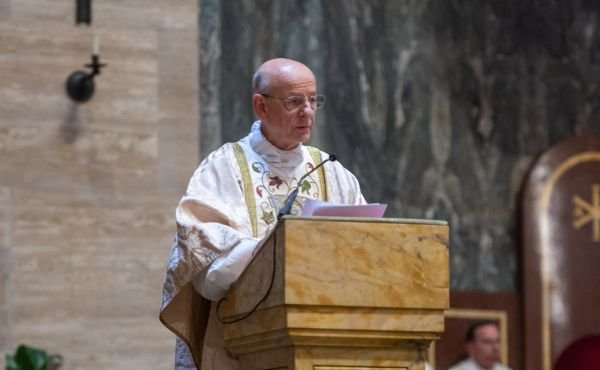Homily on the feast of Josemaría
On today's feast, and in light of the readings from the Mass, we can consider two aspects of Saint Josemaría's life that show us his relationship with God: divine filiation and the sanctification of work.
Divine filiation
"You did not receive a spirit of slavery to fall back into fear," Saint Paul says in one of the readings we just heard, "but you received the Spirit of adoption, through which we cry, 'Abba, Father!'" (Rom 8:15). Through Baptism, we are children of God in Christ, which implies a new way of seeing God, marked by love, trust, and simplicity—the attitudes proper to a child with their father.
Knowing that we have a Father who loves us infinitely allows us to lead a joyful and fulfilling life, illuminating all areas of our existence with that love, trust, and simplicity, even amid difficulties or when we experience our defects more acutely. God loves us for who we are—His children—and not for what we do, for our achievements. He does not stop loving us when we make mistakes. As the Pope reminds us: God always embraces us "after our falls, helping us to get up and stand on our feet" (Address, 26-I-2019). Our life is a continuous return to the Father's house, like the prodigal son, knowing that He awaits us with open arms.
Therefore, nothing is more opposed to our condition as children of God than fear. "A son of God," Saint Josemaría used to say, "fears neither life nor death, because his spiritual life is founded on a sense of divine filiation. God is my Father, he thinks, and he is the Author of all good; he is all Goodness" (The Forge, no. 987).
This does not mean that we are unaffected by the blows we receive or the obstacles we encounter in life. When a family problem, an illness, or an economic setback arises, it is normal, especially at first, to feel a certain vertigo. Something similar can happen when contemplating the situation in the world. How can we fail to remember in our prayers, among so many needs, the war between Ukraine and Russia or the dire situation in the Holy Land?

The fragility we feel in our lives and the instability of peace in the world can simultaneously strengthen us if they lead us to take refuge in the love that never fails, in that rock that is much more solid than what earthly realities can offer us. "Take refuge in your divine sonship," the founder of Opus Dei recommended. "God is your most loving Father. In this lies your security, a haven where you can drop anchor no matter what is happening on the surface of the sea of life. And you will find joy, strength, optimism: victory!" (Way of the Cross, Seventh Station, no. 2).
Sanctification of work
In the first reading, we recall another passage that speaks of God's design for the world. It is the passage that tells how God created man "and placed him in the Garden of Eden, to till it and keep it" (Gen 2:15). It is beautiful to consider once again that work—that which occupies a good part of our time—is something wonderful. Sometimes it seems to drag us down—because we do not like a task, or it becomes complicated, or simply because we are tired. However, the text from Genesis reminds us that work is not a consequence of original sin: from the very beginning, man has the honor of participating in the construction of a better world through his work. Christ spent most of His life working. Those years of work also contributed to our redemption. Jesus shows us that any task can hold a deeper value than what can be appreciated humanly.
Saint Josemaría used to repeat that the greatness of work depends on the love with which it is done. A love that manifests itself in attention to details, in the eagerness to serve others, in smiling at everyone, in the professionalism with which we perform our tasks… And all this with the primary desire to give glory to God and to serve others, who are also children of the same God. "This is why man ought not to limit himself to material production," Saint Josemaría commented. "Work is born of love; it is a manifestation of love and is directed toward love. We see the hand of God, not only in the wonders of nature, but also in our experience of work and effort. Work thus becomes prayer and thanksgiving, because we know we are placed on earth by God, that we are loved by him and made heirs to his promises" (Christ is Passing By, no. 48).
Let us turn to the maternal intercession of Holy Mary, asking her to help us always know and feel like beloved children of God and to find her Son in our work done with love.
Amen.
